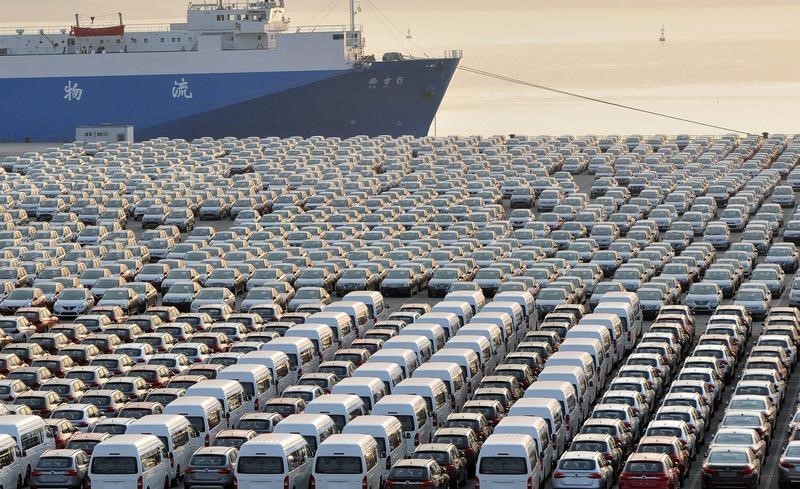Investing.com -- China, long a driver of global oil demand, is now seeing one of the sharpest slowdowns in its oil consumption in recent decades.
“China’s oil demand is growing at the slowest pace in the last 15 years (ex-COVID) with decline of -2% YTD,” said analysts at Bernstein in a note dated Thursday.
This is part of a wider economic slowdown in the country, where the previously thriving industrial and construction sectors have weakened, further contributing to the decline in demand.
Data from China’s National Bureau of Statistics (NBS) report that {{8849|oil} demand fell by 8% year-on-year in July, reaching 13.6 million barrels per day (MMbls/d), the lowest figure since 2009 (excluding the COVID period).
From January to July 2024, China's average oil demand was 14.3 MMbls/d, down by 0.3 MMbls/d or 2% y-o-y. This represents the first time China has faced a sustained decline in oil demand since 1990 (excluding the COVID downturn).
“China processed crude is down -6% y-o-y at 13.6MMbls/d in July according to China NBS data. China’s Shangdong independent refinery run rates are at 50% in July (63% last year),” the analysts said.
These lower run rates flag the struggling state of China’s refining industry, further reflecting weak demand for refined products domestically.
The drop in domestic fuel sales—an important indicator of consumer-level demand for oil products—is another worrying trend. Reports from major Chinese oil companies, PetroChina and Sinopec (OTC:SHIIY), show a 2% drop in fuel sales YTD.
This reflects weakened consumption of diesel, gasoline, and kerosene. In the second quarter of FY24, domestic fuel sales deteriorated further, with a 6% y-o-y decline, indicating continued sluggishness in demand.
The drop is stark in diesel consumption, which is down 4% YTD. Diesel is closely tied to industrial and construction activities, and its decline signals a broader slowdown in the economy.
On the other hand, gasoline consumption has remained resilient, increasing by 7% YTD, though it is expected to plateau as electric vehicle (EV) adoption accelerates.
EV penetration has now surpassed 50%, leading analysts to forecast a peak in gasoline demand within the next five years. Kerosene demand, driven by a recovery in air travel, rose by 19% YTD, but other oil products, including naphtha, liquefied petroleum gas (LPG), and fuel oil, fell by 7% YTD.
Real-time data on seaborne oil imports paints a similarly weak picture. China’s seaborne oil imports in August were down 9% y-o-y to 10.0 MMbls/d. For the year-to-date, seaborne oil imports are down by 2%, which aligns with the declining demand trends observed in domestic sales and refining activity.
“Based on current run rates and company outlook, China’s oil demand could fall by -2 to -4% (0.3-0.6MMbls/d) in 2024 which is below industry expectations,” the analysts said.
Sinopec, the country’s largest refiner, projects that domestic fuel sales will fall by 3.7% y-o-y for the full year, while refining throughput will drop by 1.9%.
The International Energy Agency (IEA), which initially forecasted oil demand growth of 0.3 MMbls/d (+2% y-o-y), is likely to revise its outlook downward in the coming months.
The fall in oil demand coincides with China’s economy seeing structural challenges, such as a slowing industrial sector, reduced property investment, and softer consumer spending.
The weaker demand for diesel and other heavy fuels is notable, as it mirrors broader economic trends, while the rise in gasoline demand may slow as electric vehicles continue to capture a larger market share.
Bernstein’s analysis indicates that China's oil demand is likely to peak within the next five years. Demand for transportation fuels—gasoline and diesel—will likely plateau by 2025 as EV adoption increases, and by 2030, total oil demand in China is expected to peak.
While demand for petrochemical feedstocks is projected to continue growing, it will not be enough to offset the decline in transportation fuels, which currently account for about 50% of China's total oil consumption.
As China's oil demand growth slows, the global oil market is likely to feel the effects. Over the past two decades, China has accounted for more than 50% of net global oil demand growth, so a slowdown or reversal in China’s demand trajectory could have significant implications for oil prices.
“Without clear signs of a turn around from China oil demand then oil prices are likely to be lower in the 2H24 and into 2025,” the analysts said.
Oil prices have sold off in response to various factors, including weaker-than-expected ISM data, reduced risks from Libyan oil disruptions, and, importantly, China’s softer demand.
Analysts at Bernstein believe that the “golden age” of China’s oil demand is drawing to a close, and this will have lasting implications for global oil markets.
While some sectors—such as petrochemical feedstocks—may continue to support demand, the overall outlook for China’s oil consumption is one of slowing growth and eventual decline.
